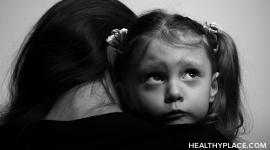Parenting with a Mental Illness: Effects on Child Development

If you’re parenting with a mental illness, chances are you’re doing the best you can to help your child develop. Mental illness can work its way between you and your child and interfere in how you want to parent. In this article, we’ll look at the challenges of parenting with a mental illness and how it affects child development.
Challenges of Parenting with a Mental Illness
Regardless of the specific diagnosis, mental illness affects how someone perceives their world, how they think and feel, and how they behave. These perceptions, thoughts, emotions, and behaviors make it hard for someone to cope with the ordinary tasks of life. The regular demands of parenting can be difficult to meet; as a result, mental illness can negatively affect child development.
A parent with a mental illness often finds it overwhelming to try to balance everything in their lives, such as holding down a job, having a spouse or partner, friendships, and parenting. Sometimes the opposite happens, and mental illness is isolating, leaving the parent with little support for themselves and their child.
Even without other aspects of life adding stress, parenting with a mental illness is daunting and can impede a child’s development. Living with a mental illness affects a parent’s ability to:
- care for and meet their children’s basic needs
- communicate effectively
- interact supportively
- model life- and coping skills
- establish and maintain a strong, positive connection with their kids
When mental illness interferes in someone’s capacity to raise their kids as they’d like to, child development can be negatively affected.
How Parenting with Mental Illness Affects Child Development
The connection between parental mental illness and child development is strong. A parent’s illness can interfere with a child’s healthy development from infancy. The most important developmental task in babies is to form a secure attachment to a parent. Living with a mental illness and the disruptions it can cause in thoughts, emotions, perceptions, and behaviors can prevent necessary bonding between mother (or father) and baby. Without healthy attachment to and relationship with a parent, a child can face problems as they grow into adulthood (Slominski, L.J., n.d.).
Without early attachment, a chasm forms between parent and child. The gap prevents the parent from properly guiding and nurturing and even doing things and laughing with their child. The problems created by a parent’s mental illness can create other issues, like:
- developmental delays at any stage of development
- poor academic performance
- difficulty with social relationships, including problems making and keeping friends
- emotional disturbances
- behavior issues
- increased risk of mood or anxiety disorders, personality disorders, and substance use or abuse
Kids sometimes resent their parent’s illness and the consequences. Negative emotions can be rooted in a variety of experiences, including:
- Anger about having to take on responsibilities for their own care and the household and thus missing out on many childhood experiences
- Guilt and self-blame for their parent’s mental illness
- Embarrassment, feeling ashamed of their parent
Parenting with mental illness is challenging and emotional for parent and child alike. That said, a parent’s illness doesn’t have to negatively impact child development. You can develop protective factors in your child and increase their resilience.
Parenting with a Mental Illness: Resilience and Hope
Kids aren’t doomed because of parental mental illness. Mental illness might diminish parenting capacity, but it doesn’t completely abolish someone’s ability to parent. Even if you are parenting with a mental illness, you can help your child thrive.
The more protective factors, or positive influences, your child has, the more resilient they’ll be. Resilience is the ability to face adversity and setbacks and get up and keep going forward. Among the things you can do for your child are
- Form a supportive, close relationship with your child, and let other family members do the same to help both you and your child.
- Create structure, limits, and consistency at home, letting other family members help you.
- Encourage your child to join teams, clubs, or other activities.
- Encourage your child to talk to you, relatives, teachers, and other mentors in their life so they have people to go to talk about ups and downs as well as learn coping skills.
- Stay connected to your child, interacting every day—even if it’s watching TV or a movie together.
- If your child is old enough, talk to them about your illness to help them understand.
Parenting with mental illness can negatively affect child development, causing significant consequences. However, you can help prevent undesirable effects by helping (and allowing others to help) your child develop skills and resilience. There is hope for you and your child.
APA Reference
Peterson, T.
(2019, July 22). Parenting with a Mental Illness: Effects on Child Development, HealthyPlace. Retrieved
on 2026, March 4 from https://www.healthyplace.com/parenting/parents-with-mental-illness/parenting-with-a-mental-illness-effects-on-child-development



